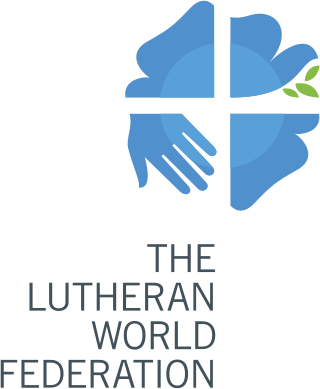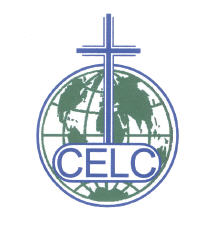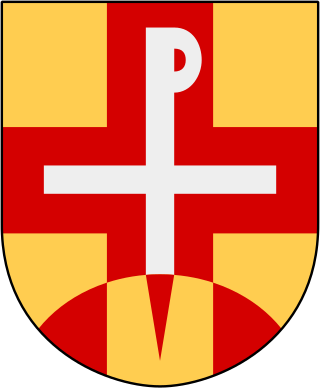Pietism, also known as Pietistic Lutheranism, is a movement within Lutheranism that combines its emphasis on biblical doctrine with an emphasis on individual piety and living a holy Christian life.
The International Lutheran Council (ILC) is a worldwide association of confessional Lutheran denominations. Member bodies of the ILC hold "an unconditional commitment to the Holy Scriptures as the inspired and infallible Word of God and to the Lutheran Confessions contained in the Book of Concord as the true and faithful exposition of the Word of God." The member church bodies are not required to be in church-fellowship with one another, though many of them are.

The Lutheran World Federation is a global communion of national and regional Lutheran denominations headquartered in the Ecumenical Centre in Geneva, Switzerland. The federation was founded in the Swedish city of Lund in the aftermath of the Second World War in 1947 to coordinate the activities of the many differing Lutheran churches. Since 1984, the member churches are in pulpit and altar fellowship, with common doctrine as the basis of membership and mission activity.

The Confessional Evangelical Lutheran Conference (CELC) is an international fellowship of 34 Confessional Lutheran church bodies.
Confessional Lutheranism is a name used by Lutherans to designate those who believe in the doctrines taught in the Book of Concord of 1580 in their entirety. Confessional Lutherans maintain that faithfulness to the Book of Concord, which is a summary of the teachings found in Scripture, requires attention to how that faith is actually being preached, taught, and put into practice. Confessional Lutherans believe that this is a vital part of their identity as Lutherans.

The Evangelical Lutheran Free Church is a confessional Lutheran denomination based in Germany and Austria. It currently consists of 1,300 members in 17 congregations. The ELFK maintains a seminary for the training of pastors in the city of Leipzig.
Concordia Lutheran Church, or, in Swedish, Lutherska Konkordiekyrkan, is a small Lutheran denomination in Sweden. It currently consists of one congregation, with about 20 members spread around Sweden.

The Mission Province is a Swedish independent ecclesiastical province founded by members of the Church of Sweden who are opposed to the ordination of women to the priesthood and episcopate. The province, which aligns with Confessional Lutheranism, considers itself as a free-standing diocese within the Church of Sweden, a position rejected by the church itself. The Mission Province was founded on 6 September 2003 and shares altar and pulpit fellowship with those in the Communion of Nordic Lutheran Dioceses, in addition to being a member of the International Lutheran Conference.

The Independent Evangelical-Lutheran Church is a confessional Lutheran church body of Germany. It is a member of the European Lutheran Conference and of the International Lutheran Council (ILC). The SELK has about 33,000 members in 174 congregations. The seat of SELK is in Hanover.

High church Lutheranism is a movement that began in 20th-century Europe and emphasizes worship practices and doctrines that are similar to those found within Roman Catholicism, Eastern Orthodoxy and Anglo-Catholicism. In the more general usage of the term, it describes the general high church characteristics of Lutheranism in Nordic and Baltic countries such as Sweden, Finland, Estonia and Latvia. The mentioned countries, once a part of the Swedish Empire, have more markedly preserved Catholic traditions.

Lutheranism is present on all inhabited continents with an estimated 80 million adherents, out of which 74.2 million are affiliated with the Lutheran World Federation. A major movement that first began the Reformation, it constitutes one of the largest Protestant branches claiming around 80 million out of 920 million Protestants. The Lutheran World Federation brings together the vast majority of Lutherans. Apart from it, there are also other organisations such as the International Lutheran Council and the Confessional Evangelical Lutheran Conference, as well as multiple independent Lutheran denominations.

The Pennsylvania Ministerium was the first Lutheran church body in North America. With the encouragement of Henry Melchior Muhlenberg (1711–1787), the Ministerium was founded at a Church Conference of Lutheran clergy on August 26, 1748. The group was known as the "German Evangelical Lutheran Ministerium of North America" until 1792, when it adopted the name "German Evangelical Lutheran Ministerium of Pennsylvania and Adjacent States".
The Seal of the Confessional is a Christian doctrine which affirms the special protection and privilege of the words spoken during confession between a penitent and his or her pastor. A form of this principle exists in the doctrine and practice of many modern Lutheran churches.
Lutheranism is a major branch of Protestantism, identifying primarily with the theology of Martin Luther, the 16th-century German monk and reformer whose efforts to reform the theology and practices of the Catholic Church launched the Protestant Reformation.
The Lutheran Confessional Church is a Christian Lutheran church, originally organised in 1974, with congregations in Sweden and Norway. It has church fellowship with the Wisconsin Evangelical Lutheran Synod.
Lutheranism was first introduced to Angola in the late 1800s, when Finnish missionaries began working in northern Namibia and southern Angola. Following the Portuguese defeat of Mandume Ya Ndemufayo in 1917, the Lutheran church in Angola was repressed by the Roman Catholic Portuguese authorities. In 1956, Lutheranism was reestablished in Angola, and in 1991, the Evangelical Lutheran Church of Angola was organized as an independent church body. In 1997, a smaller group of conservative Lutheran missionaries helped to organize a second Angolan Lutheran church: the Confessional Lutheran Church in Angola.
The Evangelical Lutheran Church in Kenya is a Lutheran denomination in Kenya. It is a member of the Global Confessional and Missional Lutheran Forum, the Lutheran World Federation-joined in 1970, the International Lutheran Council-joined in 2005, and the National Council of Churches of Kenya. Its current archbishop is the Most Reverend Joseph Ochola Omolo.
The Global Confessional & Missional Lutheran Forum is a global gathering of national and regional Lutheran churches. The forum was founded in Dallas, Texas by invitation of the North American Lutheran Church in 2015 to bring together Confessional Lutheran bodies who wish to emphasize missional discipleship as the focal point of ministry in the world. The gathering can be seen as an alternative to the more liberal Lutheran World Federation and to the more conservative International Lutheran Council and Confessional Evangelical Lutheran Conference.
The Communion of Nordic Lutheran Dioceses are Lutheran dioceses that entered into schism with their nordic national churches in 2003 due to what they perceived as "the secularization of the national/state churches in their respective countries involving matters of both Christian doctrine and ethics". These dioceses are members of the International Lutheran Council, a body of Confessional Lutherans, they are in full communion with one another and include the Evangelical Lutheran Mission Diocese of Finland, Mission Province of the Church of Sweden, and the Evangelical Lutheran Diocese of Norway. These dioceses entered into schism with the Evangelical Lutheran Church of Finland, Church of Sweden, and Church of Norway, respectively, though the Mission Province considers itself to be a non-territorial diocese within the Church of Sweden. Their lines of apostolic succession derive from other traditional Lutheran Churches, such as the Evangelical Lutheran Church in Kenya; Walter Obare Omwanza, presiding bishop of the Evangelical Lutheran Church in Kenya, assisted by bishops Leonid Zviki from Belarus, David Tswaedi from South Africa, Børre Knudsen and Ulf Asp from Norway, consecrated Arne Olsson in apostolic succession as the Ordinary for the Mission Province. The first bishop of the Evangelical Lutheran Mission Diocese of Finland, Risto Soramies, was then ordained by Matti Väisänen of the Mission Province of the Church of Sweden. These dioceses have an Evangelical Catholic churchmanship, reflective of the influence of High Church Lutheranism and Pietist Lutheranism in Scandinavia. As such, the Communion of Nordic Lutheran Dioceses affirms:
We believe, teach and confess that biblical faith and doctrine which is founded on the prophetic and apostolic Scriptures of the New and the Old Testament and which has been expressed in the three main creeds of the Early Church, that is, the Apostolic, the Nicene-Constantinopolitan and the Athanasian Creed, and in the unaltered Augsburg Confession, and that is rightly and bindingly explained by all the books accepted into the Book of Concord of the Lutheran Church.







